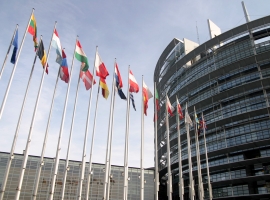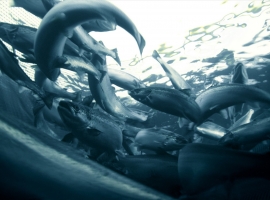
European Union banks may face increasing risks from bad loans totalling 1 trillion euros when the European Central Bank cuts back its economic stimulus program, internal EU documents seen by Reuters said.
Banks have been saddled with more so-called non-performing loans (NPLs) following the 2008 global financial crisis, as companies and households have struggled to pay their debts. This in turn has crimped their ability to make new loans.
While the problem is more acute in countries such as Greece and Italy, which have experienced a prolonged economic crisis, it has "a European dimension" with spill-overs possible, a report by representatives of EU countries and regulators said.
And the risks posed by NPLs to the whole EU banking system may increase, "should monetary conditions become less accommodative," a document accompanying the report said.
The ECB is scheduled to cut the pace of its bond purchases, which it has used to try to stimulate economic growth, by a quarter to 60 billion euros a month from April.
Although it will continue them until at least the end of the year, it is also preparing the ground for a gradual phasing out of its aggressive stimulus measures, sources said.
EU countries with the highest rates of bad loans have returned to growth since the ECB launched its stimulus program in 2014, but it remains unclear what will happen when this ends.
While banks are likely to benefit from higher interest rates, which improve the margin they make on their loans, this may be offset by the effects of another an economic slowdown.
The report will be discussed at a meeting of EU finance ministers in Malta on April 7-8 on how to tackle the NPL issue and a more detailed version is expected in spring.
Germany, the EU's largest economy, has so far opposed EU-funded solutions to the problem, arguing that it is only an issue in some countries and it is up to them to resolve it.
In absolute terms, more than a quarter of all EU bad loans are held by Italian banks, with Banca Monte dei Paschi di Siena , which is negotiating the terms of a multi-billion-euros bailout with EU regulators, holding the largest proportion of bad loans compared to its capital.
German banks hold only 2.6 percent of the loans classified as soured, while in Greece and Cyprus nearly half of all loans are difficult to recover, according to the latest European Banking Authority (EBA) data.
Greek banks are being urged to reduce their high load of bad loans, a source said on Wednesday.
In Portugal NPLs are almost 20 percent of the total, and in Slovenia and Italy the ratio is above 16 percent, against a slightly declining EU average of 5.4 percent.
To tackle the problem, the EBA proposed in January setting up a publicly-funded bad bank that would acquire soured loans at prices higher than the market is now ready to pay..
This could help create a secondary market for the loans, which banks now are reluctant to sell because prices are too low and there are too few buyers.
While UniCredit, Italy's biggest bank, has sold 17.7 billion euros of bad loans at average 13 percent of their gross nominal value this year, it has also raised 13 billion euros in the markets to compensate the capital shortfall.
Italian lenders price bad loans at 41 percent of their nominal value on average, but the quality of the credit varies and few could afford a capital rise on the scale of UniCredit's.
While Germany did not endorse the EBA plan, the EU documents point at the development of a secondary market for NPLs as a priority.
But this issue remains controversial and is likely to require a compromise at political, rather than technical, level at the Malta meeting, an EU official familiar with the discussions told Reuters.
The documents also suggest a wider "restructuring of banking sectors" as states address the NPLs problem. This could lead to mergers among EU banks after they offload their bad loans, a banking industry official said.
"Time limits" to conclude insolvency procedures are also suggested as a way of boosting the value of bad loans, as recovering them would become easier and less costly. This proposal would complement European Commission plans to shorten bankruptcy procedures and the recovery of bad loans. (Reuters)
Source: www.businessworld.ie

















